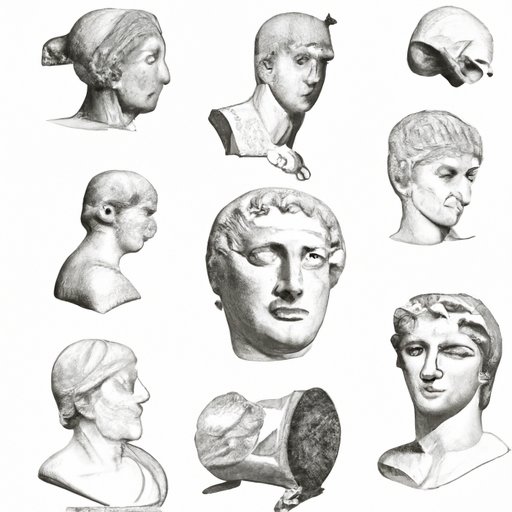Introduction
The Greco-Roman culture is a term used to describe the shared cultural heritage of many countries in Europe and the Mediterranean region. It encompasses the cultures of Ancient Greece and Rome, as well as their influence on the modern world. This article will explore the origins and influence of Greco-Roman culture, as well as its contributions to language, literature, law, government, religion, myth, art, architecture and philosophy.
Examining the Origins of Greco-Roman Culture
The Greco-Roman culture can be traced back to the development of the ancient Greek city-states, beginning around 1000 BC. These city-states were autonomous entities, each with their own laws and customs. Over time, they developed their own distinct culture, which was heavily influenced by the gods and goddesses of Ancient Greek mythology.
The Greco-Roman culture was further shaped by the expansion of the Roman Empire, beginning in the third century BC. The Romans adopted many aspects of Ancient Greek culture, such as language, literature, law and government. They also incorporated various religions and customs from the peoples they conquered, creating a unique blend of cultures.
The Greco-Roman culture was also deeply impacted by the conquests of Alexander the Great. He united the Greek city-states under his rule, encouraging the spread of Hellenistic culture throughout the Mediterranean region. He also established cities, built monuments and promoted the study of philosophy. His legacy can still be seen in the art, architecture and philosophy of the Greco-Roman world.
Exploring the Influence of Greco-Roman Culture on Modern Society
The Greco-Roman culture has had a profound influence on the modern world. It has shaped language, literature, law and government, as well as philosophy and science. Here we will look at some of the ways it has impacted modern society.
Greco-Roman Contributions to Language and Literature
The Greco-Roman culture has contributed significantly to the development of language and literature. Many English words are derived from Latin or Greek roots, and the Greco-Roman alphabet is the basis for most modern European languages. Greco-Roman literature, such as Homer’s Iliad and Odyssey, Virgil’s Aeneid and Ovid’s Metamorphoses, have had a lasting influence on Western culture.
Greco-Roman Contributions to Law and Government
The Greco-Roman culture also played a major role in the development of law and government. The Greeks developed the concept of democracy, while the Romans created a legal system that served as the foundation for many modern legal codes. Both cultures also had an influence on the development of modern political systems.
Greco-Roman Contributions to Philosophy and Science
The Greco-Roman culture has had a major impact on philosophy and science. Pre-Socratic philosophers such as Thales and Pythagoras laid the groundwork for future thinkers, while Socrates, Plato and Aristotle established the foundations of Western philosophy. Stoicism, Epicureanism and Cynicism were also influential philosophical schools in the Greco-Roman world. In terms of science, the Greco-Roman culture made significant advances in mathematics, astronomy, medicine and engineering.
Analyzing the Impact of Greco-Roman Religion and Mythology
Religion and mythology were integral parts of Greco-Roman culture. Both Greeks and Romans practiced polytheism, worshipping a variety of gods and goddesses. Popular gods and goddesses included Zeus, Apollo, Athena and Aphrodite. Myths and legends were also an important part of Greco-Roman culture, providing explanations for natural phenomena and serving as moral lessons.
Discovering the Contributions of Greco-Roman Art and Architecture
The Greco-Roman culture has left an indelible mark on art and architecture. Greco-Roman sculpture and paintings can be found in museums all over the world, while temples, amphitheaters and monuments remain standing as reminders of the culture’s enduring legacy. Examples of Greco-Roman art and architecture include the Parthenon in Athens, the Colosseum in Rome and the Pantheon in Paris.
Investigating the Role of Philosophy in Greco-Roman Culture
Philosophy was an important part of Greco-Roman culture. Pre-Socratic philosophers such as Thales and Pythagoras sought to explain the natural world through reason and observation. Socrates, Plato and Aristotle developed more systematic approaches to philosophy, laying the groundwork for later thinkers. Stoicism, Epicureanism and Cynicism were popular philosophical schools in the Greco-Roman world.
Comparing and Contrasting Greco-Roman and Ancient Egyptian Civilizations
Although Greco-Roman and Ancient Egyptian civilizations both had a deep impact on the modern world, there were many differences between them. For example, Ancient Egyptians practiced a polytheistic religion, while the Greeks and Romans worshipped a pantheon of gods and goddesses. Ancient Egypt was also known for its monumental architecture, while the Greco-Roman culture is renowned for its sculptures, paintings and temples.
Conclusion
The Greco-Roman culture is one of the most influential and far-reaching cultures in history. Its origins can be traced back to the development of the ancient Greek city-states and the expansion of the Roman Empire. It has had a profound impact on language, literature, law, government, religion, myth, art, architecture and philosophy. Its contributions have shaped the modern world and will continue to do so for generations to come.
In conclusion, the Greco-Roman culture has left an indelible mark on the world and continues to shape our lives today. From its origins to its influence and contributions, it remains one of the most powerful and enduring cultures in human history.
(Note: Is this article not meeting your expectations? Do you have knowledge or insights to share? Unlock new opportunities and expand your reach by joining our authors team. Click Registration to join us and share your expertise with our readers.)
